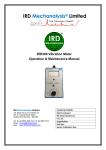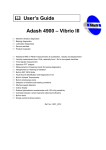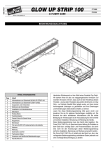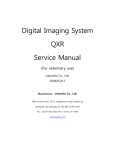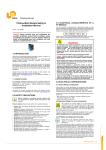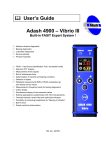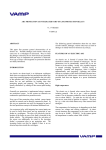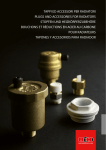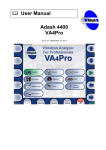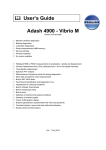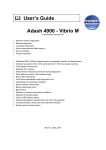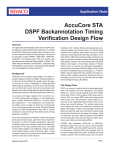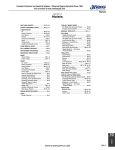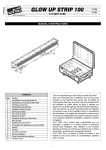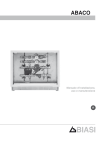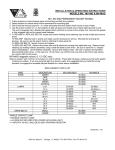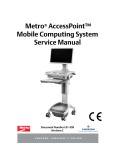Download User Manual - IRD Mechanalysis Limited
Transcript
IRD Mechanalysis® Limited Vibration Diagnostic SmartMeter model IRD449 Operation & Maintenance Manual V2.1 Mar12 IRD Mechanalysis® Limited Customer Details 1/5, Marol Co-op Ind. Estate Ltd Off. M. Vasanji Road, Marol Andheri (E), Mumbai – 400 059 Date Purchased: Tel: 91-22-2852 2906, Fax: 91-22-2852 1814 Email : [email protected] Web. : www.irdmechanalysis.com Organisation: IRD Serial Number (s): P.O. ref: End User: Next Calibration Due: IRD Mechanalysis® Ltd IRD449 VDSM O&M Manual IRD Mechanalysis Limited www.irdmechanalysis.com IRD Mechanalysis® Limited continues to be the industry leading provider of Condition Management Solutions. With 35 years’ experience in machinery vibration and associated condition monitoring technologies, the company designs and manufactures proven instrumentation suitable for rugged industrial environments. A comprehensive range of products and services are available from the offices below. Location Address Delhi Sagar Deep, Plot No.11, LSC Saini Tel: +91-011-22373916 Fax: +91-011-22370778 Enclave, Vikas Marg, Email: [email protected] New Delhi 110092 Kolkata 153/A, 2nd Floor, VIP Road, Kolkata 700 054 Contact Numbers Tel: +91-033-23559214 Fax: +91-033-23559214 Email: [email protected] Mumbai 1/5 Marol Co-op. Industrial Estate Tel: +91-022-28522906 Ltd, Off. Mathuradas Vasanji Road, Fax: +91-022-28521814 Marol, Andheri (East) Email: [email protected] Mumbai 400 059 Chennai 7-C Chesney Nilgiri Apartments 65, Commander-In-Chief Road Chennai 600 105 1/5 Marol Co-op. Industrial Estate National Ltd.,Off. Mathuradas Vasanji Service Centre Road, Marol, Andheri (East), & Works Mumbai 400059 International 1/5 Marol Co-op. Industrial Estate Ltd.,Off. Mathuradas Vasanji Road, Marol, Andheri (East), Mumbai 400059 Tel: +91-044-28230726 Fax: +91-044-28234702 Email: [email protected] Tel: +91-022-28520178 Tel: +91-022-28596214/6573 Fax: +91=022-28521814 Email: [email protected] Tel: +91-22-2852-0178 Fax: +91-22-2852-1814 [email protected] [email protected] condition management solutions 1 IRD Mechanalysis® Ltd IRD449 VDSM O&M Manual TABLE OF CONTENTS Page Number Getting you Started 1. Why perform vibration diagnostics…………………………………………....4 2. Why IRD449 Vibration Diagnostic SmartMeter?.........................................5 3. 3.1 3.2 3.3 3.4 3.5 3.6 3.7 3.8 3.9 3.10 3.11 Vibration Diagnostics - Basic Information…………………...……………...6 Introduction Basic Rules Machine and bearing condition diagnostics Methods for ball bearing condition diagnostics The relation between gears and ball bearings Fault Source Identification and Diagnostics Tool Measurement Points The preparation of the measurement point Listening to Vibrations Using Headphone Relationship of Measuring in Acceleration and Speed Abbreviations used in the guide 4. 4.1 What Will You Get with Your Instrument……………………………………11 Instrument and accessories 5. Before You Start…………………………………………………………………12 6. 6.1 6.2 Standards for vibration measurements……………………………………..13 Setting Vibration Limits in IRD449 VDSM Dominant Frequency 7. 7.1 7.2 7.3 7.4 7.5 7.6 7.7 7.8 7.9 7.10 7.11 Quick Start………………………………………………………………………..18 Preparation of Measurement Point Putting in Batteries Plugging in Vibration Sensor Connectors - top panel Vibration Measurements Temperature measurement Automatic detection of the machine speed Evaluation of the machine and bearing conditions Fault Source Identification and Diagnostics Tool The Stroboscope The Torch 8. 8.1 8.2 8.3 8.4 8.5 8.6 Instrument Operation…………………………………………………………...23 LIGHT STROBO VOLUME SETUP SPEED ALARMS condition management solutions 2 IRD Mechanalysis® Ltd IRD449 VDSM O&M Manual 8.7 8.8 8.9 8.10 8.11 8.12 8.13 UNITS ESC Error Messages Sensor connection Error Display Value Overload Input Overload Error Measurement Error 9. How to evaluate the failure…………………………………………………….35 9.1 9.2 9.3 9.4 9.5 9.6 Overall RMS values Overall PEAK values Spectrum 200 Hz– Detection of Looseness Time signal for bearing condition evaluation Vibrations in frequency bands – gearboxes/bearings Fault Source Identification and Diagnostics 10. Response Specification………………...………………………………………40 10.1 10.2 10.3 10.4 Vibration velocity measurement frequency response Vibration acceleration measurement frequency response Velocity measurement amplitude response Acceleration measurement amplitude response 11. Calibration …………………………………………………………………….....41 11.1 11.2 Calibration Procedure for IRD449 VDSM Sensor Calibration 12. Specifications…………………………………………………………………….44 12.1 12.2 IRD449 Specifications IRD511 Sensor Specifications Keeping you Going 13. SUPPORT SERVICES………....……………………………………………………48 13.1 13.2 13.3 13.4 Benefits and Features Products supported How the National Service Centre optimises clients’ investments How to Get Service Taking you Further 14. VIBRATION BASED CONDITION MONITORING SOLUTIONS…………….....52 condition management solutions 3 IRD449 VDSM O&M Manual IRD Mechanalysis® Ltd 1. Why perform vibration diagnostics Vibration diagnostic allows checking the condition of all your machinery. You will be informed early about potential failure before the machine gets damaged and you will be able to order only real specific required maintenance (instead of expensive overhauls). The periodical measurements will allow you to keep your machines in good health. condition management solutions 4 IRD449 VDSM O&M Manual IRD Mechanalysis® Ltd 2. Why IRD449 Vibration Diagnostic SmartMeter (VDSM)? You always ask before you make a decision to buy the new instruments what unit is the best for your needs. Is it an instrument with a large amount of functions, including specialized software for data processing (which you will not ever use), or is it an instrument which is easier to use and contains all required functions? You should pay only for functions, which you will use in the field. The IRD449 is just that instrument. The instrument uses standard external accelerometer with the magnetic base. It enables correct repeatable measurements. You should not equate our unit with "vibration pens". The IRD Mechanalysis model IRD449 is a multi-function portable meter that bridges the gap between the basic and advanced FFT data collector/ analyser. It is a complete machine condition expert system than gives results without the use of a computer or lap top. It is designed for the technician, engineer and consultant who need to analyse a rotating machine on-site without investing and carrying expensive instruments to site. This single meter undertakes overall vibration measurement, three band spectrum, 200lines spectrum, Time Wave Form, temperature, tacho for speed, strobe scope. In addition it incorporates a handy inspection torch. The IRD449 caters to ISO 10816-3 with expert rules covering machine health vibration levels: that identify the prime machinery faults: Unbalance, Looseness and Alignment. An anti-friction bearing health level indication is also incorporated. Many informative screens are available. Do your machines work under optimum conditions? The IRD449 will: - Determines the condition of your bearings, including slow-running ones. - Identify insufficiently lubricated bearings. - Indicates unbalance, looseness, misalignment. - Check unbalance, alignment and loose foot - Check machine speed by built-in stroboscope. - Check machine temperature by Non-contact temperature meter. - Measures in either Metric or English units. Operation of IRD449 is easy to use. Colours green, orange and red display the status. Determination of individual machine or bearings defect types is done directly during operation, without need of use a computer or software. Despite the IRD449 is very compact and rugged, it is designed and fits in the palm of a small hand. Nevertheless the IRD449 is big in performance. The IRD449 is supplied complete set with an accelerometer, coiled cable, magnetic base, transit case and earphones. You can connect earphones to listen to machinery noise related to vibration and process. When measuring transmissions or slow-running bearings, you will quickly appreciate the benefits of the earphone accessory. condition management solutions 5 IRD449 VDSM O&M Manual IRD Mechanalysis® Ltd 3. Vibration Diagnostics - Basic Information 3.1 Introduction What is it the vibration diagnostics? This chapter explains the basic steps and you will be able to begin practical measurements. More information you can find in the literature. When we are talking about the vibration diagnostics, we mean regular measurements (usually every 2-4 weeks), whose objectives primarily are: 1. Finding of change of vibration level, it means change of machine operational condition. 2. Determining reason of this change. 3. Recommending maintenance (repair, adjustment, lubrication etc.). 4. Checking of maintenance success (including revision of dismantled part to confirm the analysis). The machine vibration diagnostics solves two basic tasks: 1. Diagnostics of machine mechanical failure (imbalance, misalignment, mechanical looseness etc.). 2. Diagnostics of rolling bearing condition. 3.2 Basic Rules 1. If the measured value of vibration increases in time, it is a change indicator - worsening of the machine condition. 2. If the measured values do not change, the machine works in stable operation condition. This doesn’t necessarily mean good condition. For example if a bearing was installed incorrectly, then there will be high signal value immediately. This value will remain stable for some time (the bearing will be able to withstand it), but then there will be a fast increase and destruction of the bearing. This short bearing life can take hours, days, weeks or even months. 3. Reliability of the diagnostics will never be 100%. There will always be defects, which develop in time shorter than regular measurements. The defects caused by material fatigue can develop in several seconds only (cracks, breaks). The proof of the diagnostic performance is primarily a decrease in maintenance costs (not to absolute zero) and a significant decrease in unexpected breakdowns (not their complete elimination). 4. Using of standards is possible only with special machines, for which the special standards exist. It is not possible to simply define limit vibration values in general for a wide range of machines. However, it is possible to create the standards for special machines (e.g. turbines), and these standards are a strong diagnostic tool. General standards have a character of recommendation on how to define the limit values. The way how to find the good condition values is to use measured values of new or repaired machine. Also you can ask the machine producer for them. 5. Shortening of an interval between measurements means more successful prevention of unexpected failures. 3.3 Machine and bearing condition diagnostics Basic defects which we’d like to find out are - Unbalance (heavy spot on the rotor causes vibrations), - Misalignment (machinery parts are not in alignment), - Looseness (machine is not properly connected with its base - soft foot), - bearing defect (wear of bearing, bad assembly, bad lubrication or overload). condition management solutions 6 IRD449 VDSM O&M Manual IRD Mechanalysis® Ltd First three defects influence the whole machine (e.g. the vibration caused by unbalance we can take from any point on the machine). We use the vibration velocity [mm/s] measurements for that. Roller (ball) bearing condition we can detect only on the nearest point. This is the local failure. We measure always vibration acceleration only [g]. 3.4 Methods for ball bearing condition diagnostics We can find out several methods for bearing condition detection in literature. We should repeat again: We have to measure vibration acceleration in [g] for correct data acquisition. All methods must satisfy the conditions. We can choose different procedures for evaluation of the acceleration signal. Measured signal can be imagined as a level of the river. It flows with appropriate speed and there are little or big waves. If we want to measure the stream we can measure the flow per hour or prompt wave's level. The value of the flow will be stable and it will change slowly. But the wave's levels are unstable because measurements have significant variety of values. The similar effects occur for bearing condition measurements. You can measure RMS value (the total energy in signal) or PEAK value (the highest peak in signal). We can use both types for evaluation, just have to realize of advantages and disadvantages. RMS measurement - advantages - disadvantages PEAK measurement - Advantages - Disadvantages - stable and well repeatable, time trends are well readable - if wear increases the response is slower then PEAK, but sufficient for maintenance. - fast response for any condition change. - not stable and well repeatable (extremely sensitive), time trends are not well readable. From these two basic measurements further measurements are derived: - gENV - envelope signal modulation. Advantages and disadvantages are in the middle of RMS and PEAK measurements. - gSE BCU, SEE, SPM - measurements are performed usually on the sensor resonance frequency. These methods have the same advantages and disadvantages like the PEAK measurement. 3.5 The relation between gears and ball bearings For gearboxes diagnose it is also necessary to measure acceleration signal like for ball bearings. When the balls are rolling over the damage tracks (pitting), the shock pulses occur in signal. Unfortunately similar shocks are also in signal from on worn or damaged gears. So if we measure gearbox with roller bearings then higher vibration values can be caused by both sources. More information for this kind of analysis you can find in chapter Vibrations in frequency range gearboxes/bearings. 3.6 Fault Source Identification and Diagnostics Tool This tool is included in the IRD Mechanalysis IRD449 VDSM. It is good message for users, because such function has never been built in the instrument in this price category. This function displays several bar graphs with traffic light colours. Two major (largest) bars are allocated to general machine condition (on the left side) and ball bearing condition (on the right side). condition management solutions 7 IRD449 VDSM O&M Manual IRD Mechanalysis® Ltd The next three bars are located in the middle. They display the severity level of UNBALANCE, LOOSENES and MISALIGNMENT (from the top). 3.7 Measurement Points The measurement location must enable repeatable measurements under the same conditions as the previous measurement. Also the direction of sensor (radial, axial for rotated machines) is important. That is why you should determine measurement points on the machine. The typical machine together with the measurement points are shown in Figure1. Figure 1 Typical measurement points on a rotating machine For the measurement in radial direction, we are going to place the sensor perpendicularly to the axis of rotation, for axial measurement along the axis. The radial measurement can be usually performed horizontally, vertically or in another angle. The importance of the angle choice should not be overstressed; choose any radial direction with easy access. The measurement points need to be prepared for the measurements. The best is to place measuring pads on a machine (see the chapter Preparation of Measuring Location). 3.8 The preparation of the measurement point On the measurement point we make a measurement. To obtain a quality measurement, the points for measurements must be prepared in advance. For regular measurements the sensor must be condition management solutions 8 IRD449 VDSM O&M Manual IRD Mechanalysis® Ltd always fixed in the same way at the same point. For diagnostics of bearings it is necessary to fix the sensor with a magnetic base. Do not push the sensor only by hand - high frequencies cannot be measured in this way. The magnetic base is firmly screwed to the sensor and then it is magnetically fixed to the metal surface of the machine. Hence the sensor is fixed and a measurement is possible. Quality of fixation markedly influences the result of your measurement. If the sensor swings or jumps about etc., your measurement is pointless. A layer of paint is also a big obstacle for higher frequencies. The magnetic base has ground surface and the same surface quality must be created on the machine. In practice, it is not possible. A flat surface 3x3 cm in size can be ground only in a workshop. Anyway, quality of the bearing’s housing steel is not high and such a surface can quickly succumb to corrosion. Then it becomes unusable. Solution to this problem is to use measurement pads. These are the cylinders with the diameter approx. 26 mm and height 10 mm with a ground surface, made of a magnetic stainless steel. They are fixed to chosen points with special glue, which ensures a perfect transmission of the high frequency vibrations. The pad is covered with a plastic cover, which is removed only for the measurement. Another advantage of the cover is that when the machine is painted, your measurement point is preserved. The paint would devalue the pad. It is sufficient to coarsely grind the machine’s surface and degrease it before the pad is glued. Durability of the pads in time is unlimited. In practice, it is always until a forcible removal. You will need mainly the following aids: angle grinder, set of files, sand paper, degreaser (ethanol, solvent), measurement pads and glue. Prepare the surface in the following way: - remove the paint, corrosion or unevenness from the surface by grinding, - degrease the surface. The pad is being fixed on measurement point with the glue. We usually use the METAL TECH SG cement, also other glues with similar properties may be used. The METAL TECH SG cement is a 2-component epoxy cement with properties best suited for this task. The two components, after mechanical mixing, chemically react and after drying they form a hard material resistant to pressure, temperature and humidity. In the case of the simple pad the procedure is as follows: cut-off a disc approx.3 mm thick from the cement with a sharp knife. Wet your fingers and work the disc into a homogenous lump. Roll a cylinder with the diameter approx. 2-3 mm from this lump and put it on the side, which is not roughened. Push the pad with glue to the prepared place and, while constantly pushing and turning the pad there and back with circular movements, observe that the cement is being evenly pushed out along the circumference of the pad. The purpose is to make the layer between the pad and the surface as thin as possible. condition management solutions 9 IRD449 VDSM O&M Manual IRD Mechanalysis® Ltd ATTENTION CEMENT MUST NOT BE PUSHED OUT COMPLETELY! Pushed out cement may be removed or levelled out around the pad. In the end you put a cover on the pad. When using the T pad, amount of the cement is dependent on the size of the gap between the motor ribs and it is not so easy to determine amount of the cement to process. As with the simple pad, the surface between the ribs must be well cleaned and degreased. The space shall be filled with the necessary amount of the cement so that only the cylindrical part of the pad remains visible after drying of the cement. In the end put the cover on the pad. 3.9 Listening to Vibrations Using Headphones A user can connect headphone to the IRD449 – Vibration Diagnostic SmartMeter instrument, since listening to a measurement signal also enables a differentiation of a problem type. People can think that this is an old method, which does not have a place in this modern world. The opposite is true. Analysis of gears and low speed bearings (e.g. in paper mills) gain better quality by using the listening method. The listening can easily be done by any maintenance person without deeper knowledge of diagnostics. If there is a defective bearing, distinct rumbling sound is audible in the earphones then. If the bearing is OK, then you can hear only a weak noise. HEADPHONE WARNING Listen at moderate volumes to avoid hearing damage. Always remove the headphone from the ears when you move the sensor or re-connect cable. 3.10 Relationship of Measuring in Acceleration and Speed Maintenance staff usually measure vibrations in mm/s or inch/s (velocity) only and not vibrations in g = 9.81 m/s2 (acceleration). This is a relic of the past, when old equipment enabled the vibration speed measurement only. Bearing defects are not recognizable by using velocity measurements. If the velocity value increases due to a bearing defect, then the defect is already serious and there is an acute danger of unexpected breakdown. The measuring of the velocity vibration does not give early enough warning before failure of a rolling bearing. NOTE: For accurate bearing condition measurement you have to measure the acceleration vibration! 3.11 Abbreviations used in the manual RPM CPS RMS PEAK – Revolutions per minute – Revolutions per second – RMS value of the measured signal – Peak value of the measured signal condition management solutions 10 IRD449 VDSM O&M Manual IRD Mechanalysis® Ltd 4. What Will You Get with Your Instrument 4.1 Instrument and accessories The instrument package consists of the following standard accessories: SNo. ITEM 3, 4. 5. Sensor Accelerometer, model IRD511, Standard, 2-10KHz, 100mV/g, Top Exit, Mil 2 Pin, 1/4"-28UNF Female Mounting Thread with National Traceable Cal. Cert. Cable Assembly Coiled, for model IRD944/ IRD449 Binder to accelerometer Mil spec 2-Pin connector, expandable to 1.6m Headphones Magnetic Portable Base, IRD500 Series Accels Carrying Case for model IRD449 6. Manual Operating instructions in English and CD 1. 2. PART NO. Qty M5111005001000 1 M60164 1 M91208 M24828 M25352 1 1 1 M44999 1 The standard package for IRD449 consisting of the meter, cable, sensor, headphones, Carrying Case & manual is depicted in Figure 2. Figure 2 IRD449 – Vibration Diagnostic SmartMeter with standard accessories condition management solutions 11 IRD449 VDSM O&M Manual IRD Mechanalysis® Ltd 5. Before You Start Ignoring any of the recommendations mentioned below may cause failure of the instrument. Handling voltage higher then +24 VDC can cause an accident. 1. Always connect only ICP type sensors into an ICP marked socket! If unsure, consult the procedure with your supplier. 2. Never plug this instrument into 230 V household voltage! 3. To power this instrument, use batteries with max. nominal voltage of 1.5 V! 4. To power this instrument, use only alkaline or rechargeable (NiCd, NiMH) batteries. Regular carbon-zinc batteries are not suitable. Use correct battery polarity. Incorrect polarity will cause destruction of the instrument! HEADPHONES WARNING! Listen at moderate volumes to avoid hearing damage. Remove the earphones from the ears when you move the sensor or re-connect cable. condition management solutions 12 IRD Mechanalysis® Ltd IRD449 VDSM O&M Manual 6. Standards for vibration measurements Vibration measurements without a standard for comparison are seldom of any use. There needs to be some guide to show how much is too much. Table 1, provides a guide for Machine Tool Vibrations. The values listed merely indicate the range in which satisfactory parts have been produced. Actual tolerances must be determined by your own experience as to what vibration levels permit the meeting size and finish tolerance. Table 1 Tentative guide to vibration tolerances for machine tools Type of machine Displacement of vibration as read with sensor spindle bearing housing in the direction of cut Grinders Tolerance Range Thread Grinder 0.25 - 1.5 microns Profile or contour Grinder 0.75 - 2.0 microns Cylindrical Grinder 0.75 - 2.5 microns Surface Grinder (Vertical Reading) 0.75 - 5.0 microns Gardner or Besly type 1.25 - 5.0 microns Centreless 1.0 - 2.5 microns Boring Mill 1.5 - 2.5 microns Lathe 5.0 - 2.5 microns These values come from the experience of IRD personnel who have been trouble shooting machine tools for over 10 years with the IRD equipment. They merely indicate the range in which satisfactory parts have been produced and will vary depending upon size and finish tolerance. NOTE: The above tolerance ranges consist of machine vibration displacement values at which acceptable parts can generally be produced and are supplied as a guide for judging the indicated vibration as a warning of impending trouble. The measurements were obtained with the vibration sensor mounted on the spindle bearing housing in the direction of the machine cutting. The units in which vibration severity may be measurement displacement, velocity or acceleration – are interrelated to one another. Displacement is used for measuring the condition of slower speed machinery, particularly where displacement standards have been established or where excessive unbalance is present. However, Velocity measurements provide a measure of the combined effects of vibration frequency as well as displacement and can be universally applied regardless of machine speed or type of trouble. This type of measurement provides a direct indication of the vibration severity and is generally the best indicator of the machine balance or condition. Acceleration is generally used when vibration occurs at high frequencies and often where the frequency of the source is many times the shaft RPM. condition management solutions 13 IRD Mechanalysis® Ltd IRD449 VDSM O&M Manual The vibration amplitude should be obtained in velocity and in whatever other units are desired. Measurements in displacement or acceleration will provide an indication of the vibration severity only if the dominant frequency of the machine vibration is known. Since the vibration velocity is consistent with rotational speed, vibration severity measured in terms of vibration velocity is most common. One such machine vibration severity chart is tabulated in Table 2A for general machines and in Table 2B for large machines. Table 2A General Machinery Vibration Severity Chart (metric) for Medium and Large Industrial Machines Vibration Severity Guidelines for Medium & Large Industrial Machines - Ref: ISO 10816-3 Group 2 Group 1 Medium Size Machines Large Size Machines Vibration Rated Power Velocity 15 KW to 300KW 300KW to 50 MW mm/sec RMS Shaft height 160mm-315mm Shaft height >315mm Generally with Antifriction Bearings Generally with Sleeve Bearings 11 DAMAGE MAY OCCUR 7.1 SHORT TERM OPERATION 4.5 3.5 2.8 2.3 1.4 CONTINUOUS LONG OPERATION NEWLY PUT INTO OPERATION 0.71 Foundation Rigid Flexible Rigid Flexible Table 2B A general machinery vibration severity chart (metric) for General Machines. Vibration Velocity mm/sec RMS 0.28 0.45 0.71 1.12 1.80 2.80 4.50 7.10 11.20 18.00 28.00 45.90 Vibration Severity Guidelines for General Machines - Ref: ISO10816-1 Class I Class II Class III Class IV Large Machines (> Large Machine Small Machines Medium Machines 75KW) (>75KW) (< 15 KW) 15KW to 75 KW Rigid Foundation Flexible Foundation GOOD ACCEPTABLE TOLERABLE UNACCEPTABLE condition management solutions 14 IRD Mechanalysis® Ltd IRD449 VDSM O&M Manual 6.1 Setting Vibration Limits in IRD449 VDSM It’s possible to set up these values directly in the unit. Then the measured values are displayed in traffic light colours. You can choose IRD Mechanalysis limits (recommended) or ISO10816 limits tabulated in Table 2A & 2B. Setting up is in menu under the mode SETUP (see instrument operation). Coloured marks according to ISO10816 are ranges A and B, displayed by green colour. Range C is amber and range D is red. This is tabulated in Table 3A and Table 3B for machine groups 1&3 and 2&4 respectively. It’s necessary to choose a type of evaluation R13, F13, R24 or F24. Table 3A Classification of vibration values for machines groups 1 and 3 Foundation class Rigid (R13) Flexible (F13) RMS velocity values mm/s in/s 2.3 4.5 7.1 3.5 7.1 11.0 0.09 0.18 0.28 0.14 0.28 0.43 Border Zone A/B B/C C/D A/B B/C C/D Table 3B Classification of vibration values for machines groups 2 and 4 Foundation class Rigid (R13) Flexible (F13) 6.2 RMS velocity values mm/s in/s 2.3 4.5 7.1 3.5 7.1 11.0 0.09 0.18 0.28 0.14 0.28 0.43 Border Zone A/B B/C C/D A/B B/C C/D Dominant Frequency It is sometimes useful to know the Dominant Frequency of Vibration of a machine that has several rotating parts, consider, for example, a belt driven blower. The dominant frequency will reveal which part of the machine is causing the most vibration. Vibration measurements taken with the Model IRD306DI are overall vibration readings or the vector sum if all the vibration at the point the sensor is applied. Measurements taken on the motor bearings would include vibrations of the motor plus vibration from the pump transmitted through the gear box and mounting structure. Conversely, measurements taken on the pump bearings would include vibrations of the gear box plus vibrations transmitted from the motor (See Figure 3). In many cases the point with the most vibration would pinpoint which part has the trouble, but not always. condition management solutions 15 IRD449 VDSM O&M Manual IRD Mechanalysis® Ltd Figure 3 Discrete machine frequencies show different defects The Figure 3 can be used to find the dominant frequency of vibration provided the readings taken are steady, i.e. the readings do not fluctuate more than 10%. Use the following sequence to find the dominant frequency. 1. Measure and record the displacement (D) at a given point. 2. In the same manner and at the same point, measure and record the velocity (V) Be sure to use the exact same measuring point holding the sensor steady for both the displacement and velocity readings. 3. The Dominant Frequency can be found by dividing the velocity measurement (V) by the Displacement Measurement (D) and multiply by the constant 19,120. The answer will be the Dominant Frequency of Vibration is cycles per minute. Dominant Frequency (CPM) = Velocity V (millimeters/second x 19.120 (Metric units) Displacement (D) micrometers For example, in Figure 3, the motor runs at 1,750 RPM and the fan at 2,60 For example, in Figure 3, the let us assume motor runs at 1750 RPM and the pump at 5250 PM. If the measurements taken on the motor are: displacement (D) = 24 microns and velocity (V) = 6.59 mm/s. Then the dominant frequency is: (V) 6.59 x 19,120 = 5,250 CPM (D) 24 This is equal to the pump speed. Thus the pump is the dominant part and is causing the largest vibration. condition management solutions 16 IRD Mechanalysis® Ltd IRD449 VDSM O&M Manual Generally the dominant frequency will be equal to the rotating speed of the part causing the vibration, assuming that the trouble is unbalance. In any event the dominant vibrating frequency will normally be some multiple of RPM of the part. After determining the dominant frequency, the type of machine fault present may be assumed from the following table2. Table 3 Dominant machine excitation frequencies and most likely causes DOMINANT FREQUENCY MOST LIKELY TROUBLE 1 X RPM Unbalance and / or misalignment If axial vibration is large Check for bent shaft or Misalignment Looseness, misalignment Misalignment Bad roller or ball bearings or gears Oil whirl (Less than ½ RPM) 2 X RPM 3XRPM Many times RPM Less than 1XRPM Synchronous (AC Line frequency) 2X Synch. Frequency Many times RPM (Harmonically related) High frequency (Not harmonically related) Electrical problems Torque pulses Bad gears Aerodynamic forces Hydraulic forces Mechanical looseness Reciprocating forces Suspect antifriction bearings NOTE: This table is just a guideline for root cause analysis of a machine problem. There are many other causes of vibration not listed. To pinpoint all but the simplest requires a thorough analysis and interpretation of the vibration patterns of a machine using a IRD Vibration Analyser. . condition management solutions 17 IRD Mechanalysis® Ltd IRD449 VDSM O&M Manual 7. Quick Start The aim of this chapter is to introduce you this instrument, and, without reading a complete User’s Guide, enable you to measure first vibration values. This chapter does not describe full and detailed operation of this instrument or measurement methodology. Special chapters in this Guide are intended for this purpose. 7.1 Preparation of Measurement Point We have to select a measurement point before the measurement itself. We want to choose it in such way that transmission of vibrations would not be attenuated. Usually this means as close to the source of vibrations as possible (for instance at a bearing housing). We always have to measure at solid, firm part of a machine. We should not be measuring on covers and so on. The place should be clean, without corrosion and paint. It should also be flat so a sensor would not “wobble”. The best is to use a measurement base, which is glued on a machine. It has a perfect surface, plastic cover, and is made from magnetic stainless steel. This will enable you to perform the measurements on the machine at any time under the same conditions. Measurement repeatability means that you will be able to compare values well. 7.2 Putting in Batteries Batteries are accessible after opening a lid at a bottom part of the instrument. Open the lid by pressing its lower edge (the edge with hinge), the lid upper part opens easily - see Figure 4B. Do not ever use force! Proper polarity is shown in Figure 4C Do not forget to switch the instrument off before opening the power battery lid! Never handle the power batteries with the instrument switched on! 2. Open 1. Press gently Figure 4A Opening of the lid Figure 4B Placement of power batteries Figure 4C Proper cell polarity condition management solutions 18 IRD Mechanalysis® Ltd IRD449 VDSM O&M Manual 7.3 Plugging in Vibration Sensor To measure a vibration signal we need to plug in the vibration sensor with ICP power. The plugged in sensor must be a standard accelerometer with 100 mV/g sensitivity. The instrument is equipped by its own source of ICP power for connected sensor. The sensor needs to be connected at the right input plug by a supplied cable. Figure 5 depicts the instrument connected by a coiled cable to the sensor. Figure 5 The instrument with a sensor connected The headphones output is on the left (3.5mm jack). The accelerometer input is on the right side. The contact-less temperature sensor is on the bottom. Four LEDs of strobo are in the top of panel. This is depicted in Figure 6 Stroboscope LEDs Headphone connection Accelerometer Connection Temperature Sensor Figure 6 The instrument with a sensor connected 7.4 Vibration Measurements Screw the sensor onto the magnetic base. Do not forget to remove the plastic cover and a metal washer (it closes a magnetic field for longer service life of the magnet) before measuring. Place the plastic cover and the metal washer back on the magnet after measuring. Place the magnet on a measuring point very carefully. Best is to rest the edge of the magnet on its side and then slowly lower the sensor onto a machine. If you bring the magnet near to the machine with its whole area hitting the machine all of the sudden, then the strong impact can irreversibly destroy the sensor. condition management solutions 19 IRD Mechanalysis® Ltd IRD449 VDSM O&M Manual In case you use a measuring tip instead of the magnet, measured values are not going to be stable. This in not surprising. The measured values depend to a large extent on a pressure of the tip at the measurement point. The magnet that attaches the sensor generates a constant pressure so the values are stable. ATTENTION Use the measuring tip only in hard to reach places, where it is not possible to place the magnetic base 7.5 Temperature Measurement Infrared sensor for temperature measurement is aside from accelerometer input. Measurement angle is about 45 degrees around the sensor centre axis. Best results are taken with sensor distance 10-20 cm from measured surface. The relation of the sensors sensitivity Vs. the angle is shown in Figure 7A along with the size of the scanned area Vs. distance shown in Figure 7B. The accuracy of result depends of emissivity; this is typical property of IR temperature sensors. 100mm / dia 200mm 80mm / dia 160mm 60mm / dia 120mm 40mm / dia 80mm 20mm / dia 40mm FOV sensor / 90deg Fig 7A. Sensor sensitivity vs. the angle Fig 7B. The size of the scanned area vs. distance Figure 8 The temperature measurement zones in IRD449 Measured temperature is displayed in Celsius and Fahrenheit degrees. Also the coloured bar is used. The bearing symbol on the other displays is also coloured according to the actual temperature value. The ranges of colours are for less then 30°C - green, 30-45°C - yellow, 45-60°C - orange, 6075°C - red and for greater then 75°C – dark red. A typical case is depicted in Figure 8. condition management solutions 20 IRD449 VDSM O&M Manual 7.6 IRD Mechanalysis® Ltd Automatic detection of the machine speed It’s important to know the speed for evaluation of the machine condition. Instrument is looking for speed in the frequency spectrum (200Hz range).It is assumed that most of the vibration energy is located on the speed frequency. If the instrument finds significant energy level on one frequency (that means in very narrow band) then this frequency is labelled as the speed frequency. From this description is clear that the speed has not to be found always. If the higher level of energy is located in the spectrum on other line then speed frequency (for example frequency of the fan blades), then the wrong result can be displayed. However the correct speed, which must be defined for condition levels, can be entered manually as well.. 7.7 Evaluation of the machine and bearing conditions Diagnostician is always asking a basic question after measurement: “What condition of the machine should I assign to this measured value?” Machine conditions are divided into 3 levels, which have the same colours like traffic lights: 1. GOOD – GREEN COLOR Machine is in good condition, no defect is found. The operation is without restrictions. 2. ALERT - AMBER COLOR The beginning defect has been found on the machine. It is possible to operate with paying more attention and planning of repair. 3. DANGER – RED COLOR Serious defect has been found on the machine. Machine shouldn’t be in operation. Special functions are included in the instrument for detection of that three states. The overall vibration values are coloured with appropriate colour. The vibration limits IRD Mechanalysis for each state are determined from the graphs, which are printed in the IRD Mechanalysis Limit Values of Machine and Bearing Vibrations chapter. 7.8 Fault Source Identification and Diagnostics Tool Press the left arrow on the screen No.1 and the Fault Source Identification and Diagnostics screen appears. For correct evaluation the speed must be defined. The instrument can do it automatically or by user manual entry. In the left bottom corner you see the Machine icon. The vertical bar displays the general (overall) machine condition. This condition can be evocated by many reasons. The unit evaluates the severity of 3 sources, which are the most occurred in the practice: - Unbalance (circle with heavy spot icon), - Looseness (shoe icon), - Misalignment (clutch icon). Correspondent faults horizontal bars are in middle. On the right bottom corner you find the rolling bearing icon. The vertical bar displays the bearing condition. condition management solutions 21 IRD449 VDSM O&M Manual 7.9 IRD Mechanalysis® Ltd The Stroboscope The build-in stroboscope inside the IRD449 VDSM represents the unique innovation in the handheld vibration analyzer field. We use the high lighting LED technology, which low power consumption enables to use the stroboscope in our instrument. Stroboscope or stroboscopic lamp, commonly called a strobe, is the device which produces regular flashes of light. When we have to study or to visually inspect the machinery, which have cyclically moving parts, then the stroboscope enables to froze the moving ( usually rotation). Imagine the simplest form, a rotating disc with one-spaced hole. When the flashes of light are synchronized with the rotational speed of the disc, then just one flash is made during one rotation. It means, the disc is lightened up when the hole is always in the same position. It is the principle of illusion of frozen movement. A typical measurement is shown in Figure 9.. Figure 9 The Stroboscope measurement employing IRD449 7.10 The Torch You sometimes need to inspect or read the dark corners. In that time you are lucky with IRD449 VDSM, because this instrument has built-in torch in front panel. Please refer Figure 10. Figure 10 The IRD449 Torch operation condition management solutions 22 IRD Mechanalysis® Ltd IRD449 VDSM O&M Manual 8. INSTRUMENT OPERATION 8.1 Switching on and off The instrument is switched on by pressing of the middle button (shown in Figure 11) Instrument ON/OFF Figure 11 IRD449 Power ON Provided that batteries with sufficient voltage are placed in the instrument then a display will show an instrument Logo. If the batteries are weak the IRD449 sign is bordered in red (Please refer Figures 12A, 12B & 12C) VDSM VDSM Fig 12A Switching on Figure 12 IRD449 Power ON Fig 12B Switching off Fig 12C Switching on with weak batteries Description of numbers in initial screen: 1. The sensor sensitivity mV/g times 10 ( 983 means 98,3mV/g) 2. Firmware version ( V2.05dtH) 3. HP filter frequency for bearing in kHz ( 0,5 kHz) The instrument is switched off by pressing and holding the same button for a longer time. The POWER OFF appears on the display. Release the button and the instrument switches off. 8.2 Standby Mode When the user does not press any button for 10 minutes, the instrument changes the standard run mode to the Stand by mode - the screen is darkened. When the user does not operate with the instrument next 30 minutes, the instrument switches off. condition management solutions 23 IRD Mechanalysis® Ltd IRD449 VDSM O&M Manual 8.3 Information line After powering on the display shows measured data. Beyond descriptions of the measured values and their actual values the display shows an information line in its upper part.Please refer Figure Figure 13 Information Line on display Meaning of Displayed Symbols: - moving “wave” signifies measurement in progress, - setting of earphone output volume is indicated by yellow coloring of the bars, - this symbol shows an approximate battery status. If the battery symbol is filled more, then more battery power remains. If the status goes under 20 %, the remaining energy shows in red, if it is insufficient, the symbol is red and the instrument switches itself off. Battery status symbol: 100% 8.4 approx. 50% under 20% just before switching off Using of Headphone The instrument is equipped by a 0.5 W amplifier for connecting of earphones and listening to a measured signal. We can connect the headphone by a stereo 3.5 mm jack marked phones on the top of the instrument. After connecting we can hear a signal from the vibration sensor in the earphones. Advisable volume can be set-up by the VOLUME item from the instrument menu (Please refer Figure 14 for details) Increase Volume button Decrease Volume button Switch measuring/volume control Figure 14 IRD449 Headphone Control condition management solutions 24 IRD449 VDSM O&M Manual 8.5 IRD Mechanalysis® Ltd Selection of Measurement A selection of measuring screen (method) can be performed by arrow buttons ▼ ▲. After press of a button an “empty screen” is shown without measured data, and the measuring starts. Please refer Figure 15 for the controls. Measuring Screen Selection Switch measuring/volume control Figure 15 IRD449 Measuring Screen Selection Buttons 8.6 Measurement Methods Screens Figure 16 Measurement Methods Screen Please refer Figure 16 for the measurement method screens. Overall RMS values Measurement of RMS vibration values in the ranges: 10 Hz - 1000 Hz in mm/s, 0.5 kHz - 16 kHz in g, with estimated value of machine speed frequency. Based on the speed and vibration values of the machine condition, colour of displayed value - green / amber / red - is determined. The colour of bearing is determined regarding to the measured temperature. condition management solutions 25 IRD Mechanalysis® Ltd IRD449 VDSM O&M Manual Fig 17A Overall Peak Values Fig 17B Spectrum 200Hz Looseness Fig 17C Time Signal for Roller Bearing Please refer Figure 17A, 17B and 17C for the measurement screens. Overall PEAK values Measurement of peak vibration values in the ranges:10 Hz - 1000 Hz in mm/s,0.5 kHz - 16 kHz in g Spectrum 200 Hz–looseness detection FFT analysis of vibrations in the range: 2 Hz - 200 Hz in mm/s RMS, with display of 3 maximum peaks found .The peaks are ranked according to amplitude vibration size. Time signal for roller bearing diagnosis Measuring of time signal and vibrations in the range: 0.5 kHz - 16 kHz in g. Displays actual measured time signal and gENV value. Fig 18A Vibration in Frequency Range Gearbox/Bearing Fig 18B FASIT Screen Fig 18C FASIT Screen – No RPM Please refer Figure 18A, 18B and 18C for the measurement screens. Vibrations in frequency ranges – gearbox/bearing Measurement of RMS vibration values in the ranges: 0.5 kHz - 16 kHz in g, 1.5 kHz - 16 kHz in g, 5 kHz - 16 kHz in g. FASIT Expert System The FASIT screen. It displays the severity levels of machine faults. Also the temperature bar is displayed on the right side. When the RPM is not found then no results are displayed (from ver.2.05). condition management solutions 26 IRD Mechanalysis® Ltd IRD449 VDSM O&M Manual Fig 19A Overall RMS Displacement Fig 19B Overall Peak Displacement Overall RMS and Peak displacement values in the range 2-200 Hz in mm. From ver.2.05, the displacement is displayed in microns. This is depicted in Figure 19A and 19B. 8.7 Speed detection and definition After switch on of the instrument the Screen depicted in Figure 20A appears and the automatic speed detection begins. The detection procedure is displayed as running bar in the bottom of screen. The result is also displayed on the bottom. Fig 20A Start-up screen for automatic speed detection Fig 20B Automatic Speed Detection- Last Speed Value When the automatic speed detection is not successful (see Automatic detection of the machine rotation chapter), the last speed value is loaded from the memory and displayed together with the message (Figure 20B) Push arrows, it changes the value of speed with the step 250 RPM. When the correct speed (or the value near the correct speed) is defined, push Enter button for confirmation. If no pushbutton is used for approx. 4 seconds, then the displayed value is accepted. The word <set> is changed to! MAN!, then this word informs all the time the user, that speed is entered manually. When you need to set exact value and the 250 RPM step is too much, then use the STROBO item from the MENU. condition management solutions 27 IRD Mechanalysis® Ltd IRD449 VDSM O&M Manual Figure 21A RPM set manually Figure 21B RPM detection switched OFF If the automatic detection is switch on, this procedure of speed detection runs always when the Screen No.1 appears. !RPM OFF! is displayed when the RPM detection is switched off. Please refer Figure 21A and Figure 21B 8.8 Menu for functions selection By pressing button, the instrument menu appears. If the instrument is in the error stage (for example “SENSOR ERROR“), then some functions are not available. LIGHT STROBO VOLUME SETUP SPEED ALARMS UNIT ESC - - Torch mode - Stroboscope mode - Phone output volume adjustment - This item opens next item selection: - Set of speed detection - Selection of standard, which will define limit values - Unit options for a measuring of a velocity signal (mm/s vs. ips) - Return to the measuring screen If the error is detected (e.g. “SENSOR ERROR"), then some item are not available. Move between items by pressing ▼ ▲ buttons. Select item by pressing button. Use - ESC for return from Menu. Please refer Figure 22 A, B & C for details. Menu Selection Buttons Figure 22A IRD449 Instrument Menu Menu Enter/Escape Button Figure 22B IRD449 Instrument Menu (in error stage) Figure 22C IRD449 Measuring Screen Selection Buttons condition management solutions 28 IRD Mechanalysis® Ltd IRD449 VDSM O&M Manual 8.8.1 LIGHT In LIGHT mode it’s possible to use instrument like a torch. Select the LIGHT mode and press button. White LEDs on the front side begins to light. Symbol of a torch appears on display as shown in Figure 23. Press any button to switch off the light and the instrument starts to measure again. Figure 23 Torch Mode 8.8.2 STROBO In STROBO mode you can use the instrument as a stroboscope. White LEDs on the front side begins to flash with a frequency, which is set up on the screen. If the speed detection is known, then frequency of flashes is set to that value. By pressing ▼ ▲ buttons you can also change that frequency manually. The step (1, 10,100 RPM) is displayed on the bottom line of the screen. Press button and the STROBO menu appears. You can switch-off (STOP) the stroboscope or the change the step frequency tuning. Please refer Figure 24A and 24B for details. Escape STROBO Preset Frequency in RPM & Hz Options for frequency step Preset Step ▼▲ Increasing/Decreasing Fig 24A RPM set manually Fig 24B Strobo Mode Menu condition management solutions 29 IRD Mechanalysis® Ltd IRD449 VDSM O&M Manual 8.8.3 VOLUME The volume bars appear. The volume is changed by buttons ▼ ▲. When the maximum volume is reached, the symbol will become orange otherwise the amount of yellow filling shows the actual volume. If the earphones are off, the symbol is grey. Next press of the button returns the instrument back to the measurement mode. Please refer Figure 25 A and Figure 25B for details. Swicthed Off CCA 50% Maximum Figure 25 A Volume Adjustment Figure 25 B Displayed Volume During the instrument is switched on or off, the range is changed, the sensor is connected or disconnected, the short unpleasant crack can be heard. This is not a defect of the instrument. ATTENTION Be careful not to overload the headphone amplifier by excessive volume. This will distort a signal in the headphone. You can use any stereo or mono headphones with nominal impedance higher than 8 Ω. Both output stereo channels are connected to the signal. 8.8.4 SETUP Further functions menu appeared. Choose requested function using arrows and confirm by condition management solutions Enter. 30 IRD Mechanalysis® Ltd IRD449 VDSM O&M Manual 8.8.5 SPEED Fig 26A Speed Menu Setting Fig 26B Speed Menu AUTO Please refer to Figure 26A and 26B for menu screens. Switch on (AUTO ON) or switch off (AUTO OFF) automatic detection of RPM. The manual enter is required, when AUTO OFF. For ver.2.05 and higher more options are available: AUTO - automatic speed detection MANUAL - always manual entry of speed OFF - speed value is ignored, no limits with relation to speed are used. 8.8.6 ALARMS Standards setup, Alert limits (amber colour) and Danger (red colour) will be defined. Please refer to Standards for vibration measurements. Fig 27A Alarm Setting Fig 27B Alarm Setting with Machine Symbol Chosen standard is displayed in the Figure 27B above, the machine symbol (F13 in this case). If IRD Mechanalysis standard is chosen, nothing is displayed. 8.8.7 UNITS Vibration speed unit can be chosen here. mm/s (millimetres per second) and ips (inch per second) are available. Device remembers chosen unit even after switch off. condition management solutions 31 IRD449 VDSM O&M Manual IRD Mechanalysis® Ltd 8.8.8 ESCReturn to the MENU screen. condition management solutions 32 IRD449 VDSM O&M Manual 8.9 IRD Mechanalysis® Ltd Error Messages 8.9.1 Sensor connection Error When incorrect connection of a sensor, unsuitable sensor type, broken cable etc. is detected, then the temperature screen occurs and the error message is written upon the values. 8.9.2 Display Value Overload When the value exceeds the range of display, then OVR is displayed. 8.9.3 Input Overload Error If an input signal is too strong (higher than 12V peak), the instrument cannot process it, the overload error is displayed. The instrument is not capable of measuring this signal. condition management solutions 33 IRD449 VDSM O&M Manual IRD Mechanalysis® Ltd 8.9.4 Measurement Error If there is a break in communication between measuring and display boards inside of the instrument, this measurement initialization error is displayed (MEAS INIT). If you see this error, it means that the instrument is malfunctioning and we recommend to send it to the manufacturer for repair. condition management solutions 34 IRD449 VDSM O&M Manual IRD Mechanalysis® Ltd 9. HOW TO EVALUATE THE FAILURE The instrument shows measurement results on several separate screens. We shall describe basic rules for their use. 9.1 Overall RMS values - Machine symbol - this line shows RMS velocity vibration value in mm/s or ips, which is excited on the machine by mechanical phenomena related to: - imbalance of rotational parts of the machine (fan wheel, impeller, clutch wheel etc.), - incorrect axis alignment of the assembly – misalignment, - mechanical looseness of individual machine parts, - large free play in seating of rotational machine parts (shaft - bearing, shaft – bearing housing), - clutch free play (e.g. free play on a shaft, pressed out grooves and tongues), - loose or worn out machine anchor bolts, - defective base, - insufficient frame or anchoring flange rigidity, - damage to machine rotation parts - (bent shaft). - Bearing symbol – this line shows RMS acceleration vibration value in g, which is excited by a condition of bearing. This condition is related to: - time wear of the bearing, - bad lubrication (with new bearings as well), - incorrect installation (with new bearings as well), - abrading of bearing. The thermometer symbol is drawn together with the bearing. The temperature color is used according the actual measured value. SPEED - The machine speed is displayed at the bottom part of the screen (if it is available). RPM means revolutions per minute. The instrument performs automatic detection of machine revolutions using a spectrum analysis. This function does not have to be always successful, because the revolutions may not be possible to read for every spectrum. If the speed is not determined, it is not a malfunction. It is hard to do it, for example, in machines with gears. If the speed is available, then and vibration values have been coloured corresponding to vibration limits. Machine conditions are divided into 3 levels, which have the same colours like traffic lights: 1.GOOD – GREEN COLOUR Machine is in good condition, no defect is found. The operation is without restrictions. 2.ALERT - AMBER COLOUR The beginning defect has been found on the machine. It is possible to operate with paying more attention and planning of repair. condition management solutions 35 IRD449 VDSM O&M Manual IRD Mechanalysis® Ltd 3. DANGER – RED COLOUR There is an serious defect found on the machine. Machine shouldn’t be in operation 9.2 Overall PEAK values Similar rules for evaluation of the measured values, as in the previous screen are valid for this screen with one difference. The peak (PEAK) vibration values are displayed. It is highest measured value in certain time, which is important for transient shock events evaluation, especially in cases of incipient bearing defects, like: - microscopic peeling off of a hardened surface layer in the place of a rolling element contact with a bearing ring (regular shocks), - contamination of bearing space by metal particles (irregular shocks), - cracks. Shocks which cause these defects are also parts of the RMS vibration values. However, the peak value of such shock is hidden in a value which contains all other information about vibrations, i.e. noise from possible abrading, wrong lubrication and overloading. To simplify, the RMS is an average value of all vibration values achieved in certain time. If a large peak value (one shock) appears in this time period, it will be lost in the final recalculation of all the values. This practically means that during increasing of this bearing defect that causes the shock, the PEAK value of this shock will visibly increase, while the effective (RMS) value will increase only slowly. We can discover the initial defect time of the bearing sooner. But PEAK value is not so stable as RMS value. For bearing condition measurement is the RMS measurement sufficient. 9.3 Spectrum 200 Hz– Detection of Looseness This screen is important for detection of the mechanical looseness. When the graph shows a number of lines (typically 3 or 4) with the same space between them and the first line is on the speed frequency (see the value description on the bottom) probably mechanical looseness is the machine problem. The most common causes of this defect are: - soft flanges, condition management solutions 36 IRD Mechanalysis® Ltd IRD449 VDSM O&M Manual - loose anchoring bolts, - cracks in frames – cracked welds, - free play in rotational part seating, - or possibly other problems not related to mechanical looseness, - bent shaft. See also FASIT chapters. 9.4 Time signal for bearing condition evaluation Fig 28A Time Signal for bearing vibrations Fig 28B Undamaged Bearing Fig 28C Undamaged Bearing – wrong lubrication Fig 28D Damaged Bearing The time signal of bearing vibrations is displayed. gENV value is under the time signal (envelope modulated signal. Please refer Figure 28A The time signal is displayed as a direct record, not after envelope modulation. Look at three basic screens for easy work with this function. Undamaged bearing: (Refer Figure 28B) This bearing generates a low amplitude noise only, whose time record shape is steady. It’s necessary to have a look on the range of the graph (left side). Signal could look high but it’s not when the graph range is low (for instance 0,5 g). Undamaged bearing – wrong lubrication: (Refer Figure 28C) The time record shape is steady too but it has bigger amplitude then previous case. You can clearly see different (bigger) range of the graph (1,0 g) condition management solutions 37 IRD449 VDSM O&M Manual IRD Mechanalysis® Ltd Damaged bearing: ((Refer Figure 28D) There are clearly visible shocks caused by a rolling element coming across the damage like pitting or crack here. The shocks repeat themselves regularly. The range of the graph is different again (2,0 g in this case). 9.5 Vibrations in frequency bands – gearboxes/bearings. Figure 29 Gearbox Vibration- Acceleration in three frequency bands When we need to find the failure on not simple machines (e.g. gearbox) then it is very useful to know the vibration values in several frequency bands. Figure 29 shows measurement acceleration values in three frequency bands: 0.5 – 1,5 kHz, 1.5 – 5 kHz and 5 kHz – 16 kHz. Example: We are going to show the analysis procedure on a signal obtained on a seating of an inlet transmission shaft with the speed frequency 25 Hz (1500 rpm) and with a gear with 65 teeth. So called tooth frequency can be obtained by simple multiplication of the shaft revolution frequency (in Hz) by the number of teeth. fGMF = fspeed * z fGMF gear mesh frequency fspeed speed frequency z number of teeth In our example the tooth frequency is 1625 Hz (so approx. 1,6 kHz). What are the possibilities? The transmission is OK and tooth frequency of 1,6 kHz slightly increases vibrations in the second frequency band. Bearing failure - vibrations are concentrated in the last frequency range 5 – 16 kHz 9.6 Fault Source Identification and Diagnostics Description of FASIT has been described in the beginning of this manual. For correct evaluation the speed must be defined. The instrument can do it automatically or by user manual entry. The machine condition is divided into 3 levels, which have the same colours like traffic lights. The same approach we also use for fault detection. This screen is depicted fault diagnosis screen in Figure 30, condition management solutions 38 IRD449 VDSM O&M Manual IRD Mechanalysis® Ltd Figure 30 Machine Fault Diagnostics Screen In the left bottom corner you see the Machine icon. The vertical bar displays the overall machine condition. This condition can be evocated by many reasons. The unit evaluates severity of 3 sources, which are the most occurred in the practice: - Unbalance (circle with heavy spot icon), - Looseness (shoe icon) - Misalignment (clutch icon). Correspondent faults horizontal bars are in middle. On the right bottom corner you find the rolling bearing icon. The vertical bar displays the bearing condition. The meaning of Machine and Bearing bars was described earlier in this manual. The temperature bar is displayed quite on right side. The ranges of colours are for less than 30°C green, 30-45°C - yellow, 45-60°C - orange, 60-75°C - red and for greater than 75°C – dark red. 9.6.1 What do the colours means in fault bars of machine and bearing? GREEN COLOR It may surprise somebody, because why to think about faults when the colour is green. But also from low level signal the procedure can read the beginning of the fault. But the operation is without restrictions. AMBER COLOR The beginning level of defect is found on the machine. It is possible to operate with paying more attention and planning of repair. RED COLOR There is the serious defect level found on the machine. Machine shouldn’t be in operation. condition management solutions 39 IRD Mechanalysis® Ltd IRD449 VDSM O&M Manual 10. Response Specification 10.1 Vibration velocity measurement frequency response 3 0 -3 -6 A [dB] -9 -12 -15 -18 -21 -24 -27 1 10 100 1000 10000 log F [Hz] Measurement accuracy (10 mm/s RMS input signal) is +/- 2.5 % (5-500 Hz frequency range) and +/- 5% (500 – 2000 Hz range). 10.2 Vibration acceleration measurement frequency response 3 0 -3 -6 A [dB] -9 -12 -15 -18 -21 -24 -27 -30 0,1 1 10 100 log F [kHz] Measurement accuracy (1 g RMS input signal) is +/- 2.5 % in 0,2 -20 kHz frequency range. 10.3 Velocity measurement amplitude response Measurement accuracy for RMS vibration velocity (0.1 – 100 mm/s range) on 80 Hz reference frequency is +/- 2.5 % 10.4 Acceleration measurement amplitude response Measurement accuracy for RMS vibration acceleration (0.1 – 10 g range) on 8kHz reference frequency is +/- 2.5 % condition management solutions 40 IRD449 VDSM O&M Manual IRD Mechanalysis® Ltd 11. CALIBRATION The calibration procedure described herein is supplied for the customer information only. No attempt to disassemble or calibrate the unit should be made except by an experienced, qualified technician using the proper test equipment. IRD Mechanalysis assumes no responsibility for the operation or units repaired or calibrated outside the factory or at an unauthorized service centre. The following test equipment are required for calibration: 1. Standard 4 ½” Digit Digital Multi-meter 2. Standard Function Generator 3. Electrodynamic Shaker NOTE: Please ensure that the test instruments used for calibration are calibrated with references traceable to National / International Standards and have valid calibration status. 11.1 Calibration Procedure for IRD449 VDSM 11.1.1 Sensor Sensitivity Before any calibration you need to know, what exact sensitivity of sensor is set in the instrument. See the initial screen, which contains this information. Description of numbers in initial screen: 1. The sensor sensitivity mV/g times 10 ( 983 means 98,3mV/g) 2. Firmware version ( V2.05 dtH) 3. HP filter frequency for bearing in kHz ( 0.5 kHz) The sensor sensitivity is not equal 100mV/g very often. The sensitivity of sensor is usually in 95-105 mV/g range. Let suppose the sensitivity which is set in the instrument is equal S. Then all calibration measurements, which are adjusted to the sensitivity 100mV/g must be multiplied by 100/S. 11.1.2 Basic test with Electrodynamic Shaker If you have an elctrodynamic shaker, you can regularly test the unit on two frequencies 80Hz and 8kHz. On the initial IRD449 screen are displayed RMS values of velocity and acceleration. The velocity value should be 10 mm/s and the acceleration should be 0.5g. The signal from the shaker with the reference sensor is adjusted for exact 100mV/g sensitivity. When the sensitivity of IRD449 unit is e.g. 95mV/g, then the higher values (10.5mm/s and 0.53g) will be displayed. Expected values from the A4801 should be multiplied by 100/95 coefficient. 11.1.3 Basic test with sensor and shaker Set on the shaker 10mm/s on 80Hz and check the RMS velocity value on the initial screen. Then set 0.5g on 8kHz and check the RMS acceleration. If you have trouble to generate the 8 kHz, you can use lower frequency, but not lower then 1200Hz. Bellow this limit the LP filtering is applied and the result would be distorted. 11.1.4 Advanced tests of velocity measurement Use the shaker and sensor. You can make the frequency response and the amplitude response. condition management solutions 41 IRD449 VDSM O&M Manual IRD Mechanalysis® Ltd Use the amplitude 10mm/s for frequency response test. Change the frequency from 6 to 1200 Hz and check the filtration curve, which is drawn in previous chapter. Also the accuracy is mentioned there. Set the 80Hz for amplitude response. Change the amplitude from 0.1 to 100 mm/s and check the accuracy (+/- 2.5%). 11.1.4 Advanced tests of acceleration measurement Use the shaker and sensor if you are able to shake high frequencies (10 kHz or more). If your shaker system does not allowed it, use the signal generator and switch the ICP off. Use the amplitude 1g for frequency response test. Change the frequency from 500 to 12000 Hz and check the filtration curve, which is drawn in previous chapter. The accuracy is +/-2.5%. Set the 8kHz for amplitude response. Change the amplitude from 0.1 to 10g and check the accuracy (+/- 2.5%). 11.1.5 Envelope demodulation test The envelope value is RMS value. Do not use comparing with peak values. Use the 8kHz pure sine signal with 1g (100mV) amplitude. The ENV should display 1.33g +/- 2.5%. 11.2 Sensor Calibration The calibration of the IRD511 Piezoelectric sensor supplied with the instrument or any other vibration sensor out of the wide range of IRD500 Sensor Series can be done at the state of the art Calibration Lab at IRD, Mumbai (Figure 31). Figure 31 State of the art IRD Calibration Lab, Mumbai This Lab has a state of the art TransCal system from Beran Instruments UK. It is an automatic digital sensor calibration system. It undertakes calibration of a sensor throughout condition management solutions 42 IRD449 VDSM O&M Manual IRD Mechanalysis® Ltd its frequency range. The master reference sensor is traceable to National Standards. Calibration Certificates are generated and stored for each sensor tested. IRD has constructed an environmentally controlled Lab environment for all sensor calibration tests. This service could be availed by all users irrespective of sensor manufacturer. For each calibrated sensor, a traceable calibration certificate is generated which is a full frequency calibration with phase response depicted on the certificate. The certificate also lists down the validity of the calibration, which is 12 months. Last but not the least; it states the national standard to which the calibration is traceable. A typical certificate is reproduced in Figure 32. Further details could be obtained from our regional offices in the four metros, Works or National Service Centre, Mumbai. The addresses and contact details are given at the start of this manual. Figure 32 A typical National Traceable IRD Sensor Calibration Certificate condition management solutions 43 IRD Mechanalysis® Ltd IRD449 VDSM O&M Manual 12. SPECIFICATIONS 12.1 IRD449 Vibration Diagnostic SmartMeter The IRD449 is a portable multi-function SmartMeter that bridges the gap between the overall level vibration meter and the advanced FFT data collector / analyser and associated analysis software. It is a complete machine condition diagnostic tool that produces results on-site without the need for a computer. It is designed for the technician, engineer and consultant who require portability, ease of use and speed to identify prime machinery faults without taking expensive delicate instruments to plant sites. It is the ideal replacement for the IRD838 basic analyser. This single instrument undertakes overall Vibration Measurement, Three Band FFT Spectrum, Time Wave Form, Diagnostics, Temperature, a Tacho for speed and Stroboscope. In addition it incorporates a handy inspection torch. The IRD449 caters to ISO 10816-3 with expert rules covering machinery health vibration levels: that identifies prime machine faults: Unbalance, Looseness and Alignment. An anti-friction bearing health level indication is also incorporated. Below is a selection of the many informative screens available: Set Up Menu RMS Vibration & High Temp 3 Spectrum Bands Time Wave Form Fault Diagnostics 3 Band Alarms Do your machines work under optimum conditions? The IRD449 will: • • • • • Determine the condition of your bearings, including slower-running rotors (120rpm) Identify insufficiently lubricated bearings Indicate unbalance, looseness, misalignment Check machine speed, unbalance and alignment etc by built-in stroboscope Measure in either Metric or English units Operation of IRD449 is easily learned. The screen displays machine status in colours green, orange and red. Determination of individual machine or bearings defect types is undertaken directly during the measurement process without the need of a computer or software. While the IRD449 is big in performance, it is compact, rugged and fits in the palm of the hand. The model IRD449 takes a variety of measurements as selected: • • • • Overall RMS and PEAK velocity (10 - 1000 Hz) Overall RMS and PEAK acceleration (500 - 16 000 Hz) Overall RMS and PEAK displacement (2 - 100 Hz) Velocity Spectrum (200 Lines FFT) The IRD449 is supplied complete with standard accessories: accelerometer, coiled cable, magnetic base, headphones and carry case. The headphones enable one to listen to machinery noise related to vibration and effects of the process. When measuring transmissions or slow-running bearings, the benefit of the headphone accessory is readily appreciated. condition management solutions 44 IRD Mechanalysis® Ltd IRD449 VDSM O&M Manual TECHNICAL SPECIFICATION Measurements: Input Input Range - 1 x ICP powered accelerometer - 60g PEAK, with standard 100mV/g sensor - (e.g. for 600g PEAK 10mV/g senor, sensitivity is programmable in the IRD449. DETECTION RMS PEAK RMS RMS RMS RMS PEAK Time Wave Form FFT Spectrum Temperature UNITS mm/sec, ips mm/sec, ips G G G um, mil um, mil G mm/s, ips oC, oF Display Stroboscope Torch Output Power: Environmental Packaging FREQUENCY - RANGE 10-1,000 (opt. 1-1,000) Hz 10-1,000 (opt. 1-1,000) Hz 500-16,000Hz 1500-16,000Hz 5000-16,000Hz 2-200Hz 2-200Hz 500-16,000Hz 4-200Hz 0-380 oC, (32-716 oF) DISPLAY 0-999 0-999 0-999 0-999 0-999 0-999 0-999 0-999 0-999 oC, oF - Colour OLED, 128 x 128 pixels, diagonal 1.5” (38mm - High intensity LED, 10 – 18000RPM (0.17-300Hz) - High intensity LED - 1 AC signal 8 Ω /0.5W for external headphones (signal listening) - 2xAA 1.5V (alkaline, NiMH, LiFe), Battery condition indicated on meter display - Operating temp -5°C to 50°C, Storage temp: - -20°C to 65°C - Aluminium with dust and splash proof seal; quick access for change of batteries Carrying case with internal protective foam Weight & Dimensions Instrument only: Instrument with Accessories: Dimensions (Instrument): - 350g. (with batteries) - 1 Kg. (complete with accessories in carrying case) -150mm (L) × 60mm (W) × 35mm (H) BILL OF MATERIALS Model IRD449 Vibration Diagnostic SmartMeter Sensor Accelerometer, model IRD511, 2-10KHz, 100mV/g, Top Exit, Mil 2 Pin, 1/4"-28UNF Female Mounting Thread with National Traceable Cal. Cert. Cable for model IRD449 Binder to accelerometer IRD511 expandable to 2.5m Magnetic holder for IRD511 Accelerometer Prod (Stinger) Al Straight for Sensor Headphones with Ear Defenders Carrying Case Manual - Operating instructions in English and CD Qty 1 Part Number M449001 M5111005001000 1 1 1 1 1 1 M60164 M24746 M11030 M91208 M25352 M44999 IRD Mechanalysis® Ltd continues to be an industry leading provider of Condition Management Solutions. With a heritage of over 60 years experience in machinery vibration and associated technologies, IRD designs, manufactures and supports proven instrumentation suitable for harsh industrial environments. The Vibration People of IRD Mechanalysis can be contacted at the following branches or your local distributor: Mumbai Delhi Kolkata Chennai International 1/5, Marol Co-op. Industrial Estate Ltd, Off. Mathuradas Vasanji Rd. Marol, Andheri (East), Mumbai 400 059 Sagar Deep, Plot No.11 LSC Saini Enclave, Vikas Marg New Delhi 110 092 153/A, 2nd Floor VIP Road Kolkata 700 054 7-C, Chesney Nilgiri Apts 1/5, Marol Co-op. Industrial 65, Commander-In-Chief Rd Est. Ltd, Off. Mathuradas Vasanji Rd. Marol, Andheri (E) Chennai 600 105 Mumbai 400 059, INDIA Tel: +91(0)22-2852-0178 Fax: +91(0)22-2852-1814 [email protected] [email protected] Tel: + 91(0)11-2237-3916 Fax: +91(0)11-2237-0778 [email protected] Tel: +91(0)33-2355-2062 Fax: +91(0)33-2355-9214 [email protected] Tel: +91(0)44-2823-0726 Fax: +91(0)44-2823-4702 [email protected] Tel: +91-22-2852-0178 Fax: +91-22-2852-1814 [email protected] ® IRD is the Registered Trademark of IRD Mechanalysis® Ltd. condition management solutions 45 IRD Mechanalysis® Ltd IRD449 VDSM O&M Manual 12.2 IRD511 Accelerometer Specifications The IRD Mechanalysis model IRD511 is a standard accelerometer for measuring vibration on industrial rotating machinery. It has a top exit Mil 2 Pin Connector. This sensor is primarily used with portable vibration meters. A magnetic round base is available as optional accessory for portable vibration measurements. Applications: Applies to most Process Plants using Compressors, Blowers, Conveyors, Cooling Tower Fans, ID, FD, PA Fans, CW Pumps, Gear Boxes, Motors, Paper Machinery, Turbines etc. Supplied Accessories Qty Part Number Optional Accessories Sensor Mounting Adaptor Stud, M6 Calibration Certificate Qty 1 M60154 1 CCIRD511 Cable 15 m Length with Mil 2Pin connector Magnetic Portable Base, IRD500 Series Accels Part No. M60048 1 M24828 Dimensions & Connections Plan View Side View Pin A 18-30 Volts Pin B 0 Volts 0.5-8.0mA Current diode Typical Connection +18 to 30 Volts 2.2 F Pin A White Sensor Input Volts out A.C. DC Bias Readout / Monitoring System 470K Pin B Black 0 Volts Technical Performance Mounted Base Resonance Sensitivity Frequency Response Isolation Measurement Range Transverse Sensitivity 22 kHz (nominal) 100 mVg + 10% Nominal 80 Hz at 22°C 2 Hz to 10 kHz ± 5% 0.8 Hz to 15 kHz + 3 dB Base isolated + 80g Less than 5% Electrical Electrical Noise Current Range Bias Voltage Settling Time Output Impedance Case Isolation 0.1 mg max 0.5 mA to 8 mA 10 – 12 Volts DC 2 seconds 200 Ohms max 8 >10 Ohms at 500 Volts Environmental Operating Temperature Range Sealing Maximum Shock Emissions Immunity -55 to 140°C IP67 5000 g EN61000-6-4:2001 EN61000-6-2:1999 Mechanical Case Material Sensing Element /Construction Mounting Torque Weight Maximum Cable length Connector Mounting Options Stainless Steel PZT / Compression 8 Nm 110 gms (nom) 1000 meters 2-pin Mil-C-5015 ¼” – 28 UNF Female Filters, Other sensitivities, Various connector assemblies Other Mountings condition management solutions 46 IRD Mechanalysis® Ltd IRD449 VDSM O&M Manual Mounting & Frequency Response Part Number Selector M = IRD Mechanalysis Product Prefix Cable/Conn Type M 08 – Fire Retardant connector 50 – Mil 2 Pin Connector Integrated Cable Length 54 – M12 Connector 000 – not applicable Product Series IRD511 Accelerometer Standard, Top Exit 5 1 1 1 0 0 5 0 0 1 0 0 Sensor Output Mounting Threads 010 – 10 mV/g 030- 30 mV/g 01 – ¼”-28 UNF Female 02 – ¼”-28 UNF Male 050 – 50 mV/g 05 – Quick Fit Female 100 – 100 mV/g 250 – 250 mV/g 06 – M6X1mm Male 08 – M8X1.25mm Male 500 – 500 mV/g 10 – M10X1.5mm Male 0 12 – M12X1.75mm Male Note on Sensor Output • • • • • Most machinery applications are suitably covered by a sensor with a sensitivity of 100mV/g. However, you may wish specify different sensitivities because of the unique dynamic range of the particular machine to be monitored. A high sensitivity sensor, 500mV/g or 1V/g would be used for those machines operating at low speeds (say below 600 rpm) with high mass structures where vibration levels signals will inherently be of a low amplitude . For high dynamic ranges such as a high speed gearbox, you would use a lower sensitivity e.g. as low as 10mV/g, 50mVg etc. To ensure sensors are matched to specialised applications we recommend a detailed vibration analysis is undertaken first IRD Mechanalysis Consultancy Services can assist you in the best sensor solution. The Vibration People of IRD Mechanalysis can be contacted at the following branches or your local distributor: Mumbai Delhi Kolkata Chennai International 1/5, Marol Co-op. Industrial Estate Ltd, Off. Mathuradas Vasanji Rd. Marol, Andheri (East), Mumbai 400 059 Sagar Deep, Plot No.11 LSC Saini Enclave, Vikas Marg New Delhi 110 092 153/A, 2nd Floor VIP Road Kolkata 700 054 7-C, Chesney Nilgiri Apts 65, Commander-In-Chief Rd Chennai 600 105 1/5, Marol Co-op. Industrial Estate Ltd, Off. Mathuradas Vasanji Rd. Marol, Andheri (East), Mumbai 400 059 India Tel: +91(0)22-2852-0178 Fax: +91(0)22-2852-1814 [email protected] [email protected] Tel: + 91(0)11-2237-3916 Fax: +91(0)11-2237-0778 [email protected] Tel: +91(0)33-2355-2062 Fax: +91(0)33-2355-9214 [email protected] Tel: +91(0)44-2823-0726 Fax: +91(0)44-2823-4702 [email protected] Tel: +91-22-2852-0178 Fax: +91-22-2852-1814 [email protected] [email protected] ® IRD is the Registered Trademark of IRD Mechanalysis® Ltd IRD Mechanalysis, an ISO9001:2008 company, continuously improves its products. It therefore retains the right to change the above specification without notice condition management solutions 47 IRD Mechanalysis® Ltd IRD449 VDSM O&M Manual Keeping you going 13. Support Services Keeping you going is a IRD Mechanalysis® commitment. Product support is an essential aspect of any progressive business. IRD Mechanalysis® Limited (IRD) is no exception; the company has been supporting former IRD, then Entek well as IRD’s products for the past 25 years. Indeed the acceptance and usage of these products by Indian industry is directly attributed to the dedicated support IRD has provided. IRD continues to invest in Customer Support. Just ‘keeping you going’ is not enough; we have facilities to National Service Centre, Mumbai ensure systems match world standards. Our instruments and systems are calibrated to National Standards. The very nature of industrial electronic instruments, both portable and permanent, demands regular calibration. From time to time it becomes necessary to repair of damaged items such as cables, sensors, power supplies and occasionally electronic circuitry etc. IRD Mechanalysis® is well equipped for such eventualities When equipment is in need of repair, a reliable repair centre that is responsive, convenient, and cost effective is required. IRD Mechanalysis® Ltd offers in-house as well as site calibration (traceable to National Standards) and repair services. This also covers our partner’s product range; IRD also supports many obsolete products where components are still available or have been indigenised. As the original equipment manufacturer (OEM), we are the most knowledgeable and the qualified to service our products. Supported by more than 50 combined years of technical service experience, our repair technicians provide the highest quality service for your IRD products. At our National Service Centre in Mumbai we stock a comprehensive supply of spare parts to ensure a quick turnaround. 13.1 BENEFITS and FEATURES For IRD Mechanalysis® Ltd’s customers, the National Service Centre offers the following: • • • • • • • • • Fast in-house turnaround options Expert factory technical assistance Industry competitive repair charges In-house calibration of vibration sensors (traceable to National Standards) Regular cleaning and calibration to extend product life and reliability Instrument hire during repair period to minimize programme interruption 1 Year warranty on Product Exchange Programme Fixed Price Repair – Whole Product 3 months warranty 90-day parts warranty on all repair and calibration services condition management solutions 48 IRD449 VDSM O&M Manual 13.2 IRD Mechanalysis® Ltd PRODUCTS SUPPORTED The National Service Centre has the capability to support the following products: • Data Collectors: IRD817, IRD818, IRD890, IRD Fast Track®, dataPAC®1000, dP1250, dP1500; Enpac® series. Also Commtest VB series of vibration analysers and profiler Portable Instruments: IRD306, MIL306, MIL306C, MIL306D, MIL306DD, IRD308, IRD350, IRD355, IRD360, IRD810, IRD811, MIL811, MIL811D, IRD820, IRD838, IRD870, IRD880, IRD885 Protection Monitors: 5802, 5806, 5815, 5915, 5800 Cards, 6100, 6600 Series, MIL8700 Series, MIL8800 Monitor Machinery Diagnostic Systems: Beran 766, 767, 768 Machinery Protection Transmitters: IRD7100 Series, IRD7200 Series, IRD7300 Series Balancing Systems: 245, 246, MILB50 and MILB150 • • • • • TM dataPAC, Enpac, and Fast Track are trademarks or registered trademarks of IRD Mechanalysis Turnaround time and repair capabilities are dependent upon condition of equipment and spare parts availability at the time of the product assessment. 13.3 How the National Service Centre Optimises Clients Investments • Annual Maintenance and Calibration ensures years of trouble free operation to maximize the investment in your condition monitoring equipment. • A complete in-house supply of spare parts assures quick turnaround for product repairs. • State of the art Sensor Calibration automatically over the full frequency range traceable and up to date to National Standards of the UK. • IRD Mechanalysis® Ltd’s ISO 9001 certification guarantees quality repairs and service. • Our highly qualified Repair Centre technicians, supported by more than 50 combined years of technical service experience, give you the best available service and results. • As the only authorized service centre for IRD Mechanalysis Ltd Products, our National Service Centre provide the most knowledgeable, experienced and committed support for all of our products. • We offer a IRD Product Exchange Programme, Fixed Price Repair or Standard Repair and Calibration Only Services: the applicable warranty benefits are given below: condition management solutions 49 IRD Mechanalysis® Ltd IRD449 VDSM O&M Manual Service Options & Process RMA issued: Instrument arrives at NSC 13.4 Calibrate it ? Fixed Price Repair ? Exchange Unit ? Repair Specific Fault ? ISO9000 Requirement 3 month Warranty 12 month Warranty 3 months Parts Warranty HOW TO GET SERVICE? 1. Before dispatching any instrument, cable, sensor etc it must be given an RMA number issued by the NSC, see below 2. For a Return Material Authorization number (RMA) this can be downloaded from our web site: www.irdmechanalysis.com 3. To discuss any instrument servicing issues please call Tel: +91(0)22-2852-0178 or one of our Regional Offices 4. Alternatively Email us at : [email protected] 5. Complete the RMA and fax back to IRD Mechanalysis® at Fax: +91(0)22-2832-1814 6. When the RMA has been issued, the Client sends the instrument with all accessories together with the Purchase Order making reference to the RMA Number. 7. Upon receipt, IRD will evaluate the instrument and make a recommendation to the Client (if no instructions on type of service have been received earlier). 8. Only when the repair has been completed and payment has been received, will the instrument be returned to the Client. 9. Warranties will apply depending on the Repair Category option LOCATIONS National Service Centre 1/5, Marol Co-op. Industrial Estate Ltd, Off. Mathuradas Vasanji Rd, Marol Andheri (East) Mumbai 400 059 INDIA Tel: +91(0)22-2852-0178 Tel: +91(0)22-2859-6214 / 6573 Fax: +91(0)22-2832-1814 Email: [email protected] Email: [email protected] Head Office (Registered) 47 – 48 Jolly Maker Chambers II Nariman Point Mumbai 400 021 INDIA Tel: + 91(0)22-2202-7430 Fax: +91(0)22-2285-0480 Email: [email protected] www.irdmechanalysis.com condition management solutions 50 IRD Mechanalysis® Ltd IRD449 VDSM O&M Manual RMA (Return Materials Advisory) Form ATTN: IRD Mechanalysis Ltd, National Service Centre, 1/5 Marol Co-op, Industrial Estate Ltd, Off Mathurdas Vasanji Road, Marol, Andheri (E), Mumbai 400 059, India. +91(0)22-2852 0178 / 2906 FAX BACK RMA FORM: +91(0)22-2852 1814 or Email to : [email protected] Product Model: Serial No: Fault details (if applicable): Please tick appropriate box Warranty Calibration Fixed Price Repair Exchange Units Standard Repair This is to advise that we are planning to dispatch the above instrument for Calibration / Repair, as detailed above, on (date):______________________ Customer’s Purchase Order No: P.O. Value: Rs. (if agreed) AMC Contract No (if applicable): Date: A purchase order must be provided before inspection will commence unless an AMC Contract is in place. When NSC receives the Return Material Authorisation it will issue an RMA number. Only then send in the instrument with its RMA Nos tagged on the instrument for tracking purposes. A PO must accompany the instrument referencing the RMA Nos. Please complete the details below to enable us to process your requirements as quickly as possible. MUST BE COMPLETED IN ALL CASES Invoice Address Delivery Address Company: Department Address: Company: Department Address: City State PIN Contact Name: Telephone: Mobile: Fax: Email City State PIN Contact Name: Telephone: Mobile: Fax: Email Users Name: Designation Signature Date NSC RMA NUMBER ISSUED: RMA/ condition management solutions 51 IRD Mechanalysis® Ltd IRD449 VDSM O&M Manual Taking you Further 14. Vibration Based Condition Monitoring Solutions IRD Mechanalysis Ltd (IRD) is a leading provider of condition management solutions with 35 years’ experience in machinery vibration measurement. IRD is credited with pioneering the concept of vibration based condition monitoring programmes in India. With the advent of computerization, IRD has established and maintained over 250 automated vibration based CM systems and has a user base of over 2200 major Producers and OEMs in India. IRD will continue to introduce new technologies to match your needs and reduce the cost of Condition Management. IRD is now rapidly expanding its International Export Division globally. We take you further by providing reliable, easy to use, rugged and a comprehensive range of vibration monitoring products & solutions (as depicted in the chart given below) and enable you to enhance your productivity and investment. We look forward to your continued support and patronage. MONITORING SOLUTIONS OFF-LINE METERS ON-LINE FFT ANALYSER PROTECTION Overall Vibration Levels Volume Data Collector Sound & Noise Level Two Channel Vibration Analyser 2 Plane Balancing Bearing Demodulation or gSE & Leak Detection AE Bearing & Lubrication Distress Fixed, Variable & Very Low RPM SERVICE TRAINING CALIBRATION CONSULTANCY COMMISSIONING Four Channel Vibration Analyser 4 Plane Balancing Decision Support Diagnostics TRANSMITTER Multi- Channel API670 Compliant Single & Dual Channel Fibre Optics Vibration & Temperature Multi-Channel Simultaneous Diagnostics SURVEILLANCE Vibration Protection to 4-20mA Vibration Signal to 4-20mA Intelligent Machine Condition Network Software WAN& LAN 32 Channel+ Surveillance Pods Distress Monitoring on Variable Speed Machines System Integrates with Data Collectors ******************************************************************************** condition management solutions 52






















































